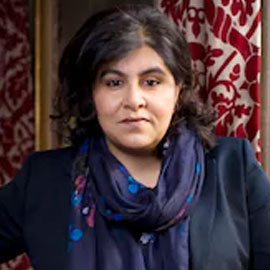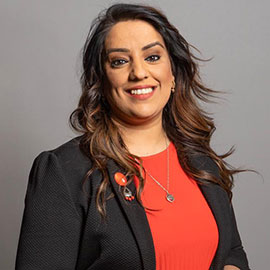Casey Report on Integration - We must discuss the findings about Muslim Communities responsibly
|
Download PDF
MEDIA STATEMENT 5th December 2016 CASEY REPORT ON INTEGRATION - We must discuss the findings about Muslim Communities responsibly Dame Louise Casey has today published her report into social integration in Britain, which includes concerns related to practices, attitudes and statistics in relation to Muslim communities. The issues she has highlighted are not new such as religious conservatism, segregation in some areas and some Muslim women experiencing inequalities. However, as these are being discussed in relation to how they may hinder integration, it is important that her findings are discussed responsibly and not taken out of context. There is a duty of care to be objective particularly given the current political climate of rising anti-Muslim sentiments. Shaista Gohir OBE, Chair of Muslim Women's Network UK, said: "Powerful anecdotal personal accounts from women who have had negative experiences such as being told how to dress or not to leave the house or drive without the husband's permission or without a male chaperone, should not be used to suggest that these attitudes and experiences are widespread because they are not. However, as some religious scholars (including through satellite TV channels) do promote very patriarchal interpretations of Islam, it is important to counter this by empowering women with an understanding of their rights in Islam, as there is often a lack of knowledge of egalitarian interpretations of their faith." The report also raises concerns that in some cities high numbers of Pakistani and Bangladeshi women cannot speak English. We agree with Louise Casey that the English language is a strong enabler of integration because it can help women be better engaged with their children, provide access to the job market and services more fully and be better informed about rights. However, it is important not to overlook the fact that first generation Pakistani and Bangladeshi women, who could not speak English, brought up children who are now employed in a vast range of professions including being politicians, barristers, doctors, police officers etc., and who lead integrated lives. In fact our #AndMuslim campaign challenges those who question the role of British Muslim women in today's society and highlights the powerful and significant contribution British Muslim women are making to British life and culture and showing their sense of belonging and identity as a woman, Muslim and a British citizen. Another concern discussed in the report is the high unemployment rates amongst Muslim women. This is due to a range of factors and must all be addressed with equal vigour. For example, many Muslim women are choosing to stay at home and be carers of their children and elderly relatives. Tackling the cost of child care and encouraging employers to allow flexible working would not only help Muslim women but women more generally who are in similar situations. While some women may be prevented from working, others who want to work are unable to access the job market due to discrimination, an issue which is not being tackled. Shaista Gohir OBE, Chair of Muslim Women's Network UK, said: Inequalities caused by cultural abuses against Muslim women are given far more attention than hate crime and discrimination faced when accessing services and employment. This not only applies to decision makers nationally but also some secular women's groups, who are very vocal on issues such as forced marriage, honour based violence, and FGM while remaining silent on the rising levels of Islamophobia against the same Muslim women. Having said that I do agree with Louise Casey that there is reluctance by certain local institutions in not challenging the culturally related abuses due to fear of racism. This reluctance tends to be mostly amongst local authority decision makers such as local councillors who are mostly white and male. They do not feel comfortable challenging local male Muslim leaders with whom they have built relationships and work closely with. They also don't want to ask their fellow Muslim male councillors on why they are not tackling cultural abuses in their communities and also domestic violence, which is an issue for all women. It is women's groups who are having these difficult conversations and need to be better supported.' The report also highlights that some areas are segregated with Muslims making up 85% of the local population. This should not be interpreted to conclude that Muslims do not want to integrate and are choosing to isolate themselves. It is important to also present the reasons for how and why such migratory patterns occur and not being able to afford to move out of these areas. For example, there are certain areas in Britain that are also predominantly Sikh, Hindu or Jewish. When they arrived in the UK, it would have been natural for them to want to live near people of a similar cultural and faith background. They may now choose to remain in these due to convenience such as being able to buy their own food, access their places of worship or be near elderly relatives. However, it is also important to highlight that those living in segregated communities are probably interacting with people of other backgrounds while they are at work, which can make up significant part of their day. Shaista Gohir OBE, Chair of Muslim Women's Network UK, said: 'Integration is also a two way process. Very little, if any, attention is given to the role played by white families in also creating segregated communities. They moved out of these particular areas after the arrival of ethnic minorities, not due to racism, but because they were able to economically afford to move up the housing ladder and perhaps also felt more comfortable living with people of similar background to themselves. Segregation cannot be prevented or reversed unless white families are also willing to have Muslim neighbours." The Casey report makes a number of recommendations to promote integration including teaching British values in schools. While Muslim Women's Network UK is supportive of promoting values such democracy, rule of law, tolerance, justice and equality, it is important to also important to point out that these are not unique to being British. Such values are also promoted by all faiths and any changes in the curriculum should therefore include similar points of reference within Islam, Christianity, Judaism, Sikhism and Hinduism. Taking such an approach would help to ensure these values resonate with children, who identify with a faith. Ends For further information contact: Shaista Gohir OBE (Chair of MWNUK) 0121 236 9000 / 07802 225989 / contact@mwnuk.co.uk / contact@shaistagohir.com Faeeza Vaid (ED of MWNUK) 0121 236 9000 / 07535 703567 / contact@mwnuk.co.uk / faeeza@mwnuk.co.uk Muslim Women's Network UK (www.mwnuk.co.uk) is the national leading Muslim women's charity working to improve the social justice and equality for Muslim women and girls. |
|















